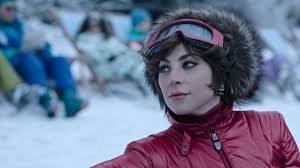
The House of Gucci
As reported by Dollyforme
I liked this movie, it’s hard to believe that Ridley Scott has another movie so soon after his last one, variously known as “Lady Gucci” and “Black Widow”, Reggiani became the centre of a very 1990s scandal involving lust, money, fashion, murder… and a clairvoyant. To that tabloid-friendly cocktail, Ridley Scott’s latest “true story” potboiler adds a dash of pop superstardom, with Lady Gaga (Oscar- nominated for her close-to-home performance in A Star Is Born) relishing the chance to find the human cracks beneath a larger-than-life, femme fatale surface.
I must say, Lady Gaga is wonderful in this flick, an amazing performance. The movie was adapted by screenwriters Becky Johnston and Roberto Bentivegna from the non-fiction book by Sara Gay Forden.
House of Gucci charts a crowd-pleasing course from the Milanese party scene of the 1970s to a high-profile, end-of-the-century trial. At its heart is the doomed romance between Patrizia and Maurizio Gucci, the latter played behind stylishly studious glasses by cinema’s sexy nerd de nos jours, Adam Driver. “I want to see how this story goes,” says Patrizia, embarking upon a twisted fairytale romance with the grandson of Guccio Gucci that starts with masked balls and talk of midnight chimes and pumpkins and ends with family back-stabbings, jealous rages and deadly rivalries.
In the beginning, all is operatic passion as Patrizia scrawls her number in lipstick on the windscreen of Maurizio’s scooter. It’s a striking image: him, a dork on two wheels; her, a high-wire circus act, unicycling her way across the big top of dynastic wealth. She may not know a Klimt from a Picasso, but Patrizia has go-getting oomph to spare, like a classier relative of Nomi from Paul Verhoeven’s Showgirls.
That’s certainly how Jeremy Irons’s increasingly vampiric Rodolfo sees her when he disowns his son for marrying into a family of “truck drivers!”. Sly Uncle Aldo (Al Pacino) is more enamoured, falling for Patrizia’s brassy charms, allowing her and his nephew to get their hooks into the fashion house he co-owns with his brother. One minute, Patrizia is a trucking magnate’s daughter, the next she’s Lady Macbeth, preparing to “take out the trash”.
Equally swift is the transition from happy marriage to hellish separation, with spicy innuendo (“I’m sure Maurizio would love your strudel”) signalling a super-fast shift of devotions from Patrizia to Paola (Call My Agent’s Camille Cottin). Behind it all lurks the shadow of The Godfather, providing an archetypal template for everything from a rural outdoor feast over which Pacino presides to the intercutting of dark deeds and baptismal dunkings, albeit in bathwater rather than holy water.
And then there is Jared Leto, an actor whose mantra of late seems to be “never knowingly underplayed”. As Aldo’s idiot son Paolo, Leto appears to be starring in his own private awards audition tape. Having walked the full length of the hair and makeup counter, he arrives on screen resembling Andy Kaufman’s absurdist alter ego Tony Clifton, a prosthetic symphony of silly suits and protruding guts. As for his voice, while others adopt faintly ridiculous Italian inflections, Leto delivers his lines in a string of high-pitched whoops that suggest he is attempting to communicate with whales. Only Pacino comes close to matching Leto’s parodic screen presence; later scenes pairing the two in states of tragic disarray look like outtakes from an Italian remake of Little Britain.
Like Scott’s 2017 Getty family drama All the Money in the World, House of Gucci does a solid job of evoking its recent-history milieu, boasting a beige and brown palette that reeks of nicotine and caffeine, with occasional bursts of reportage-style monochrome. Musically, it’s a cheesy jukebox treat, Pavarotti and Tracy Chapman rubbing shoulders with Caterina Caselli and Blondie, and a wedding played out to the strains of George Michael’s Faith.
Overall, Gaga deserves a gong for steering a steely path through the madness – for richer, not poorer; in kitschness and in wealth.



